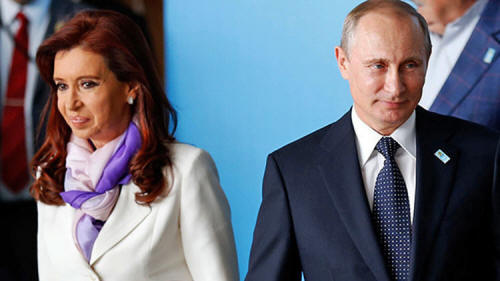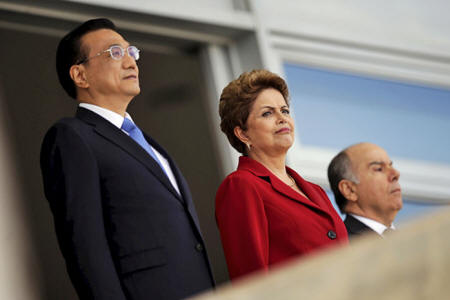|

by Pepe Escobar
May 22, 2015
from
RT
Website
Spanish summarized version
|
Pepe Escobar is the
roving correspondent for Asia Times/Hong Kong, an
analyst for RT and TomDispatch, and a frequent
contributor to websites and radio shows ranging from the
U.S. to East Asia. |

Russia's President
Vladimir Putin (R)
and Argentina's
President Cristina Fernandez de Kirchner
arrive to the
official photo session for the BRICS summit
(Reuters / Sergio
Moraes)
It started in April with a rash of deals between Argentina and
Russia during President Cristina Kirchner's visit to Moscow.
And it continues with a $53 billion investment bang as Chinese
Premier Li Keqiang visits Brazil during the first stop of yet
another South American commercial offensive - complete with a sweet
metaphor: Li riding on a made in China subway train that will ply a
new metro line in Rio de Janeiro ahead of the 2016 Olympics.
Where is the U.S. in all this? Nowhere; little by little, yet
inexorably,
BRICS members China, and in a
smaller measure, Russia, have been no less than restructuring
commerce and infrastructure all across Latin America.
Countless Chinese commercial missions have been plying these shores
non-stop, much as the U.S. did between World War I and II. In a key
meeting in January with Latin American business leaders, President
Xi Jinping promised to channel $250 billion for
infrastructure projects in the next 10 years.
Top infrastructure projects in Latin America are all being financed
by Chinese capital - except the Mariel port in Cuba, whose financing
comes from Brazil's BNDES and whose operation will be managed by
Singaporean port operator PSA International Pte Ltd. Construction of
the Nicaragua canal - bigger, wider and deeper than Panama's -
started last year by a Hong Kong firm, to be finished by 2019.
Argentina, for its part, clinched a $4.7
billion Chinese deal for the construction of two hydroelectric dams
in Patagonia.

Chinese Premier Li Keqiang (L)
and Brazil's
President Dilma Rousseff
look on before a
meeting at the
Planalto Palace in
Brasilia, May 19, 2015
(Reuters / Ueslei
Marcelino)
Among the 35 deals clinched during Li's visit to Brazil, there was,
-
financing worth $7 billion for
Brazil's oil giant Petrobras
-
22 Brazilian Embraer commercial
jets to be sold to Tianjin Airlines for $1.3 billion
-
a raft of agreements involving
top iron ore producer Vale
Chinese investment might go some way
into overhauling Brazil's appalling network of roads, railways and
ports; airports are in slightly better condition due to upgrades
prior to the World Cup last year.
The star of the whole show is undoubtedly the proposed $30 billion,
3,500 kilometer-long,
Atlantic-Pacific mega-railway, that
is slated to run from the Brazilian port of Santos to the Peruvian
Pacific port of Ilo via Amazonia. Logistically, this is a must for
Brazil, offering it a Pacific gateway. Winners will inevitably be
commodity producers - from iron ore to soya beans - exporting to
Asia, mostly China.
The Atlantic-Pacific railway may be an extremely complex project -
involving everything from environmental and land rights issues to,
crucially, the preference for Chinese firms every time Chinese banks
deliberate on extending lines of credit. But this time, it's a go.
The usual suspects are - what else -
worried...
Watch the
geopolitics
Official Brazilian policy, since the Lula years, has been to attract
top Chinese investment.
China is Brazil's top trading partner
since 2009; it used to be the U.S.. The trend started with food
production, now it moves to investment in ports and railways, and
the next stage will be technology transfer.
The
BRICS New Development Bank and the
China-led Asian Infrastructure Investment Bank (AIIB),
of which Brazil is a key founding member, will definitely be part of
the picture.
The problem is this massive trade/commerce BRICS interplay is
intersecting with a quite convoluted political process.
The top three South American powers -
Brazil, Argentina and Venezuela, which also happen to be Mercosur
members - have been facing repeated "destabilization" attempts by
the usual suspects, who
routinely denounce the foreign policy of Presidents Dilma
Rousseff, Cristina Kirchner and Nicolas Maduro and
yearn for the good ol' days of a dependent relationship with
Washington.
With different degrees of complexity - and internal strife -
Brasilia, Buenos Aires and Caracas are all simultaneously facing
plots against their institutional order. The usual suspects don't
even try to dissimulate their near total diplomatic distance from
the South American Top Three.
And that leads us to a crucial
geostrategic issue - so far unresolved.
NSA spying may have leaked sensitive information on purpose to
destabilize the Brazilian development agenda - which includes, in
the case of Petrobras, the exploration of the largest oil deposits
(the pre-salt) found so far in the young 21st century.

The Petrobras
headquarters in Rio de Janeiro
(Reuters / Sergio
Moraes)
What is unraveling is so crucial because Brazil,
-
is the second-biggest economy in
the Americas (after the U.S.)
-
it is the biggest Latin American
commercial and financial power
-
it hosts the former
second-biggest development bank in the world, BNDES, now
overtaken by the BRICS bank
-
it also hosts the biggest
corporation in Latin America, Petrobras, also one of the
world's top energy giants
The hardcore pressure against Petrobras
comes essentially from U.S. shareholders - who act like the
proverbial vultures, bent on bleeding the company and profit from
it, allied with lobbyists who abhor Petrobras's status as the
priority explorer of the pre-salt deposits.
In a nutshell, Brazil is the last great sovereign frontier against
unbounded hegemonic domination in the Americas.
The Empire of Chaos had to be
annoyed...
Ride the continental
wave
The constantly evolving strategic partnership of the BRICS nations
has been met by Washington circles not only with incredulity but
fear.
It's virtually impossible for Washington
to do real damage to China - but much "easier", comparatively, in
the case of Brazil or Russia. Even though Washington's wrath targets
essentially China - which has dared to do deal after deal in the
former "America's backyard".
Once again, the Chinese strategy - as much as the Russian - is to
keep calm and carry a "win-win" profile.
Xi Jinping met with Maduro in January to
do - what else - deals. He met with Cristina Kirchner in February to
do the same - just as speculators were about to unleash another
attack against the Argentine peso. Now there's Li's visit to South
America.
Needless to say, trade between South America and China continues to
boom.
-
Argentina exports food and soya
beans
-
Brazil the same, plus oil,
minerals and timber
-
Colombia sells oil and minerals
-
Peru and Chile, copper, and iron
-
Venezuela sells oil
-
Bolivia, minerals
China exports mostly high-value-added
manufactured products.
A key development to watch in the immediate future is
the Transul project, which was
first proposed at a BRICS conference last year in Rio. It boils down
to a Brazil-China strategic alliance linking Brazilian industrial
development to partial outsourcing of metals to China; as the
Chinese increase their demand - they are building no less than 30
megalopolises up to 2030 - that will be met by Brazilian or
Sino-Brazilian companies.
Beijing has finally given its seal of
approval.
So the long-term Big Picture remains inexorable:
BRICS and South American nations -
which converge in the
Unasur (Union of South American
Nations) - are betting on a multipolar world order, and a
continental process of independence.
It's easy to see how that is oceans away
from a Monroe doctrine.
|



